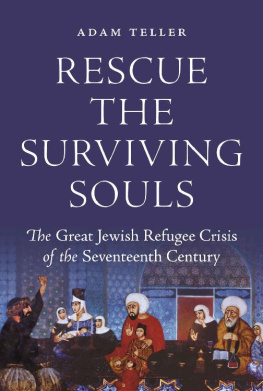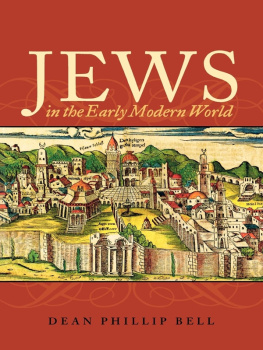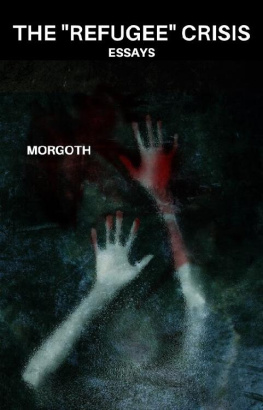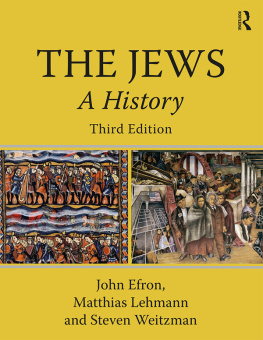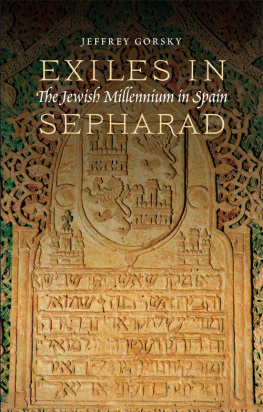RESCUE THE SURVIVING SOULS
Rescue the Surviving Souls
THE GREAT JEWISH REFUGEE CRISIS OF THE SEVENTEENTH CENTURY

Adam Teller
PRINCETON UNIVERSITY PRESS
PRINCETON & OXFORD
Copyright 2020 by Princeton University Press
Requests for permission to reproduce material from this work should be sent to
Published by Princeton University Press
41 William Street, Princeton, New Jersey 08540
6 Oxford Street, Woodstock, Oxfordshire OX20 1TR
press.princeton.edu
All Rights Reserved
ISBN 978-0-691-16174-7
ISBN (e-book) 978-0-691-19986-3
Version 1.0
Library of Congress Control Number: 2019956498
British Library Cataloging-in-Publication Data is available
Editorial: Eric Crahan and Thalia Leaf
Production Editorial: Kathleen Cioffi
Production: Danielle Amatucci and Jacqueline Poirier
Publicity: Alyssa Sanford and Kate Farquhar-Thomson
Jacket image: An Ottoman Jewish family welcomes a Jewish refugee from Poland for the Sabbath in Izmir, 164849. The Oster Visual Documentation Center, Beit Hatfutsot, Old Core Exhibition
For Rachel

PREFACE
WRITING THIS BOOK, which has taken over a decade, has led me on an intellectual journey that I could not possibly have imagined at the outset. It began as a modest exercise in economic history focused on the ransoming of the Polish Jews captured by Tatars during the 1648 Khmelnytsky uprising. It has ended up as an economic, social, religious, and cultural history of a huge refugee crisis that embraced almost all the major Jewish centers of the seventeenth century. More than that, it has taught me that the uprising and the wars that followed it were notas contemporary scholarship still holdsof passing significance but in fact set in motion a series of processes that would eventually reshape the Jewish world.
High among these were the ways in which eastern European Jewry was so successful in overcoming the massive destruction and trauma it underwent. Rather than sinking into obscurity, it was able to bounce back and become the largest and arguably the most vibrant Jewish center from the eighteenth century until the Holocaust. Another was that the cooperation between Jews in far distant places as they struggled to relieve the refugees suffering became much more intensive and purposeful, making this the first step on the long road to the creation of the closely interconnected Jewish world we know today. Finally, the massive move of populations engendered a wide range of cultural encounters and interactions that would help set the stage for the development of modern Jewish identity.
The books gaze, however, remains firmly fixed on the events of the mid-seventeenth century. At heart it tells a human story, focusing on the experiences of the refugees and captives themselves and examining them, as far as possible, on the basis of firsthand accounts. Only then does it begin to trace their fates and the attempts of various Jewish communities to help them in all the different environments where they found themselves: eastern, central, and western Europe, Italy and the eastern Mediterranean, and the Ottoman Empire from the Black Sea region to North Africa.
Tracing even the bare outlines of such wide-ranging developments was made particularly difficult because they had dropped out of the grand narrative of Jewish history. They seem to have been overshadowed on the one hand by the traditional martyrological approach to the 1648 uprising itself and on the other by the huge spiritual upheaval engendered by the appearance and conversion of the false messiah, Shabtai Zvi, immediately after it. Yet the more I looked, the more I discovered that virtually every local history of the Jewish communities involved in events mentions the appearance of the Polish Jewish refugees as a moment of importance in its development. I had, therefore, to return to this huge, mostly pre-Holocaust, literature and extract the pieces of the story one by one.
I was also amazed at the sheer wealth of primary sources that had survived even though, like the references in the historiography, they were not to be found in a single place. They were scattered across a vast range of materials of different types and often comprised just a few lines. Forced to engage in an arduous, though also hugely enjoyable, process of historical detective work, I amassed literally hundreds of source fragments from which I was finally able to reconstruct the course of events as a kind of mosaic.
My problems did not end there, however. The story to be told was not confined to the setting of the Polish-Lithuanian Commonwealth, which had been the focus of my research until then. I had a great deal more to learnthe history of the Crimean Tatars and the Ottoman Empire, Mediterranean piracy and ransoming, and the nature and activities of millenarian Protestant groups in Amsterdam and London, to name but a few of the topics. There was also a linguistic issue to be faced: the sources were in no less than twelve languages.
Still, inspired by the importance of the questions I was exploring, I decided to face the challenges and do all I could to overcome them. The result, despite its inevitable deficiencies, has, I believe, much to say to a range of audiences.
Those interested in the Jewish past will learn of a crucial but overlooked chapter of early modern Jewish history, and through it see the significance that anti-Jewish violence has had for the development of Jewish life. For this study considers not just the numbers of dead but, more importantly, how the survivors (and other Jews) struggled to overcome the effects of the violence and in so doing created a new reality for themselves.
Another key issue treated here is that of Jewish cultural development. By examining the reshaping of the Jewish world in the wake of the refugee crisis, this study identifies the forces of change not only in the non-Jewish setting in which each contemporary Jewish society found itself but also in a range of intra-Jewish connections and contacts that joined them one to another.
Those whose concerns lie elsewhere should find the book of interest too. Its analysis of the Jews transregional philanthropic networks in and around the early modern Mediterranean sheds new light on the cross-cultural nature of life there, particularly highlighting a hitherto unknown range of connections between Venice and the Ottoman Empire. Its focus on Jewish ransoming practices will also deepen our understanding of this important aspect of early modern life in the Mediterranean environment.
Perhaps most pertinently of all, this is one of the few historical studies of a refugee crisis, studying it in all its phases, from beginning to end. Dealing with refugees is an issue that continues to trouble us even today, so investigating how past societies faced those same challenges can provide scholars examining them in contemporary settings a range of new perspectives.
I could not have written a book of such complexity without a great deal of help from many friends and colleagues. First among them is David Ruderman. His enthusiastic support for me and my scholarship over many years has been of crucial importance in helping me complete the project. I have also enjoyed the ongoing help and support of Gershon Hundert and Steve Zipperstein. Thank you all very much indeed. In addition, I should like to thank Hava Turniansky and Elanan Reiner, who, first as teachers and then as colleagues, opened my eyes to the enormous importance of old-Yiddish literature for understanding the cultural history of early modern Ashkenazi Jewry.

